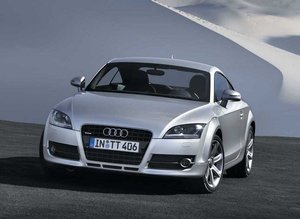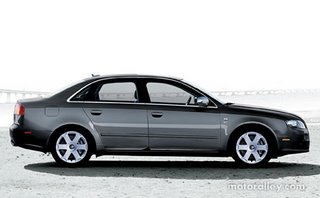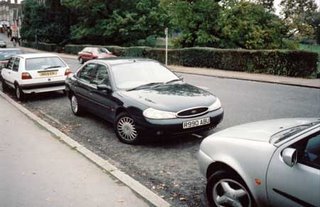Monday, April 10, 2006
Rick Wagoner, Thumbs up/Down?
According to Automotive News, Rick Wagoner asked for and received the GM Board's backing in early April. In another article, the WSJ journal indicates that GM needs a "strong leader" to survive its current contretemps. So, the real question, which no one seems to want to ask is, this:
Let's assume Rick Wagoner is the right guy. If he is the right guy, what has changed now that makes him the right guy, vs. the guy who oversaw the largest share decline in recent Automotive History?
Here's how the WSJ sums its up:
Let's assume Rick Wagoner is the right guy. If he is the right guy, what has changed now that makes him the right guy, vs. the guy who oversaw the largest share decline in recent Automotive History?
Here's how the WSJ sums its up:
GM dealers placed an ad in this newspaper Friday announcing their support of him. But Mr. Wagoner's record after six years at the helm isn't inspiring a lot of confidence among shareholders. GM racked up losses of $10.6 billion in 2005 and last month announced a series of accounting errors that span Mr. Wagoner's tenure as CEO.On the positive side...for Rick:
- He understands, better than anyone, which numbers need to be fixed. GM has an accounting problem (he's the former CFO)
- He has overseen the implementation of ruinous UAW contracts, predicated on GM market share of over 30% (currently hovering in the mid 20's) and knows better than most, the current players and the land mines in the various contracts
- He doesn't need 90-180 days to get up to speed with what's wrong...at least we hope not
- Even if Rick goes, it would be wise to keep him in office in some capacity because he knows where the land mines are
- In football analogy...he took over a Superbowl contender that was making money and selling out the "stadium"...and now they are both out of the playoff hunt and losing money. In the world of Football, he probably would not have made it through the end of this season.
- According to most, he's not a car guy. GM's problems are both financial and product. Although he gets credit for trying to bring in a car guy (Lutz) the results have proven inadequate. The product portfolio is very uneven and the continued market share decline is harsh evidence suggesting that better product concepts need to arrive...and fast, to stem market share losses.
- The Marketing/Advertising hasn't gotten the job done. After changing the marketing team the first idea out of the blocks was doomed to fail. Employee pricing simply pushed the sales problem into the future...and now we're back to the future. After initial market share gains, the true disaster of employee pricing came to light (as predicted here). Market Share has dropped again. It is obvious that these "pricing" programs do not address the fundamental market share issues. The GM programs appear to only "pull ahead" future sales out of the GM intender pool. An example of this is is "lease pull ahead." This is kind of a typically American disease -- when you run out of credit you don't spend less, you just get another revolving credit card! GM needs to focus on marketing that explains why its products are either superior, or at least as good as or a better value than its competitive set consisting of
- primarily Ford and Chrysler/Dodge/Jeep
- secondarily Honda, Toyota, Nissan, Hyundai, Kia, etc.
- GM marketing needs to focus on how to sell its cars more effectively relative to competition. Forget pull ahead "deals."
- Where are the stories of Toyota, Nissan and Honda owners trading in their overpriced cars for the value laden Chevrolets, Pontiacs and Saturns?
- Where are the stories about GM's improved quality?
- Where are the marketing programs that build positive word of mouth?
Friday, April 07, 2006
Internet Leads Buy Cars
Here's a newsflash...Cobalt/Dealix studied purchase rates of Internet leads and discovered most of them buy a car. Even better, most of them buy a car other different from their original price quote request.
This is mostly derivative, 3 year old opportunism by Dealix. Nice Job Dean Evans -- good job of reprising good info. We conducted a study back in 2003 at Stoneage and Car.com that found the same basic information. Unfortunately, car companies/dealers aren't much smarter now than they were back then. To wit:
This is mostly derivative, 3 year old opportunism by Dealix. Nice Job Dean Evans -- good job of reprising good info. We conducted a study back in 2003 at Stoneage and Car.com that found the same basic information. Unfortunately, car companies/dealers aren't much smarter now than they were back then. To wit:
- Most Car companies don't buy internet leads on behalf of their dealers...because, "they are going to buy our cars anyway"... NOT
- Dealers are now deciding that they only want to invest in their "own" traffic...except...consumers like to comparison shop. So, comparison shop sites will never go away and consumers will continue to switch because there are so many choices. Smart move is to invest in both
- Dealers still "cut off" lead providers who have lower closing ratios...and keep spending money on other marketing/advertising programs that have 1/10 the ROI
- Ad agencies and automotive marketers still believe in the "orderly" purchase funnel. There is no order...it's chaos. Shoppers don't neatly move from awareness to consideration to shopping and purchase. Sure...a small percentage do...but the rest? Total chaos. I've spoken to many internet shoppers on the phone...sadly, most auto marketers don't.
Audi...Rules...The 2007 Audi TT
 Whoa Nelly
Whoa NellySaw the Press photos for the 2007 Audi TT. Beautiful...I dare say, better than the original. Visually, more aggressive than the rounded, friendly look of the original.
In a previous rant, I talked about the need for originality. Audi styling is a personal favorite (the new grille notwithstanding) and I must say that if Audi can maintain its Quattro performance edge and quality reputation, they will take a chunk out of BMW and Mercedes.
 It's no secret that I recently traded a Porsche C4 for the "avuncular" 4 door 2006 Audi S4. Two growing sons no longer fit the Porsche 2+2 configuration. The S4, imho, is a beautiful swine of a car...a rumbling V8, quattro power and seats that would make Porsche proud. When I drive the S4, I feel like I'm carving turkey at Thanksgiving. Stay with that analogy...it grows on you.
It's no secret that I recently traded a Porsche C4 for the "avuncular" 4 door 2006 Audi S4. Two growing sons no longer fit the Porsche 2+2 configuration. The S4, imho, is a beautiful swine of a car...a rumbling V8, quattro power and seats that would make Porsche proud. When I drive the S4, I feel like I'm carving turkey at Thanksgiving. Stay with that analogy...it grows on you.The First Ding
Oh yes, checking my S4's passenger side door, I found the first ding. Whoever did this...I will find you. I will hunt you to the end of the earth.
Wednesday, April 05, 2006
Parking - The Lost Art

Those of you who know me (a rapidly shrinking tribe, I might add), know that I like to occassionally sit in Starbucks and watch Americans park (note photo is actually from the Continent, courtesy of Haywardsheath.com). I will attempt to follow this more closely in the coming days, using my trusted Treo 650 camera phone.
Some observations:
"I have a really big car so it's not my fault"
Today, a fine person (could have been a woman, but that would be gender bashing) pulled into a space next to me in a large Chevrolet Suburban, with alacrity. The parking lines were oblivious...his/her passenger side door ended up about 8 inches from my driver's side door. She was parked sort of diagonally across the silly parking lines, meaning that if I backed straight out, I could likely clip her fender. Why is this ok? As a friend once said, many large SUV owners seem to think it's just ok to park in others because, well, they have a large SUV and parking it, don't you know...is really hard.
"I just pretend my car is a boat"
At least once to twice a week, I'll be walking into Starbucks for rocket fuel when I hear a loud scraping sound...the sound of a vehicle's spoiler or under carriage abrading concrete. Some believe parking is an exercise in driving a vehicle until it meets a barrier...kind of like parking a boat...except...cars don't have "fenders" to cushion the impact. But wait...cars do have tires...so, maybe you just keep driving it up on the curb until you pull the spoiler off (never mind that grinding sheet metal noise and the pedestrians fleeing in fear), waiting for the gentle thud of the tires hitting the curb.
"My door is a battering ram"
I recently returned a nice sports car at end of lease. A nice ding was added near end of lease by another nameless large SUV (ok, it was a Ford Explorer). Door was flung open, striking my passenger's side rear quarter panel. Thankfully, only a minor ding (although, is a ding ever really minor on a Porsche?) and I made the mistake of assuming that a "minor" ding would get past the end of lease inspection. Received Bill for $200 to "repair" ding. Fortunately, I was able to talk the leasing company out of the ding by referring to the lease contract. But it brings up a fair point. Why do so many people think it's ok to wield a car door like a battering ram? Try walking up to a well dressed woman at the mall, and taking $200 out of her purse. Same basic thinking.
Monday, April 03, 2006
Hybrids Use More Energy?
According to Art Spinella of CNW Research, Brandon, OR, hybrids use more energy overall and therefore cost more to own than the venerable gasoline powered vehicle. The article hit the wire on March 31-April 1...so perhaps this is Art's way of treating us all to a nice April Fool's joke?
CNW, long known for its expertise in analyzing automotive leasing trends as well as consumer purchase motivation, took into account both the fuel costs as well as production and recycling costs of hybrids vs. traditional internal combustion engine vehicles.
In my salad days (read: when I worked on Ford's Hybrid and Electric vehicle programs in the 90s) we noted that the total cost of ownership, energy costs and pollution impact of Hybrids and electrics depended entirely on which costs you chose to include in your study. For example, if you recharged your electric vehicle in a power grid with coal fired plants, you actually increased pollution relative to a brand new ICE vehicle (ICE=Internal Combustion Engine). Lifecycle analysis is all about...assumptions. On the other hand, if you include in the price of every ICE, the cost of maintaining peace in the Middle East plus the military industrial complex...well, you might get an entirely different cost equation. :-)
 Since I have to get back to work now, I'll leave this for others to ponder...perhaps someone in the Bush Administration (Photo courtesy of the US Army)
Since I have to get back to work now, I'll leave this for others to ponder...perhaps someone in the Bush Administration (Photo courtesy of the US Army)
CNW, long known for its expertise in analyzing automotive leasing trends as well as consumer purchase motivation, took into account both the fuel costs as well as production and recycling costs of hybrids vs. traditional internal combustion engine vehicles.
"If a consumer is concerned about fuel economy because of family budgets or depleting oil supplies, it is perfectly logical to consider buying high-fuel-economy vehicles," says Art Spinella, president of CNW Marketing Research, Inc. "But if the concern is the broader issues such as environmental impact of energy usage, some high-mileage vehicles actually cost society more than conventional or even larger models over their lifetime."In the Autoblog comments I noted, with a wry creeping smile, that many doubted the numbers. I don't know the specifics of the study but I imagine that the advanced battery recycling costs, the battery replacement costs and higher acquisition costs probably off-set the fuel mileage advantages of the hybrid. Plus, there's the ugly factor, of course...something that can't currently be measured.
In my salad days (read: when I worked on Ford's Hybrid and Electric vehicle programs in the 90s) we noted that the total cost of ownership, energy costs and pollution impact of Hybrids and electrics depended entirely on which costs you chose to include in your study. For example, if you recharged your electric vehicle in a power grid with coal fired plants, you actually increased pollution relative to a brand new ICE vehicle (ICE=Internal Combustion Engine). Lifecycle analysis is all about...assumptions. On the other hand, if you include in the price of every ICE, the cost of maintaining peace in the Middle East plus the military industrial complex...well, you might get an entirely different cost equation. :-)
 Since I have to get back to work now, I'll leave this for others to ponder...perhaps someone in the Bush Administration (Photo courtesy of the US Army)
Since I have to get back to work now, I'll leave this for others to ponder...perhaps someone in the Bush Administration (Photo courtesy of the US Army)
